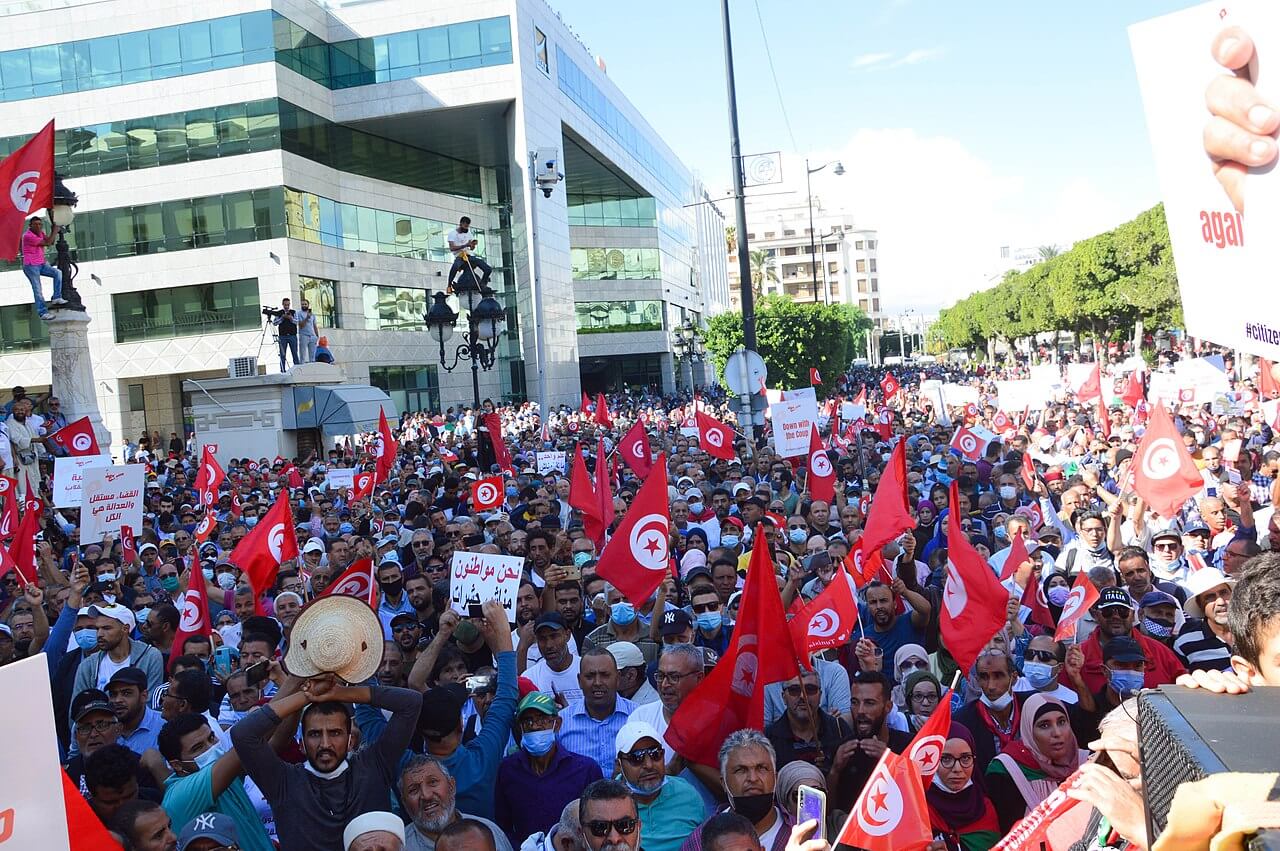Neglect for Human Rights Helped Produce the Crisis in Tunisia
The deterioration of human rights in Tunisia long precedes the co

Published by The Lawfare Institute
in Cooperation With

Tunisians are taking to the streets following President Kais Saied’s harsh crackdown against his political opponents. Amid the protests, many international observers have expressed concern over potential human rights violations committed by the Tunisian government. Among these anxieties and calls to action, it is important to understand that the deterioration of human rights in Tunisia long precedes the current instability and democratic backsliding. The country’s worsening political, economic, and social atmosphere demonstrates why human rights must be reinstated as a central focus of the West’s support for Tunisia.
Decline in Tunisian Stability and Human Rights
Over the past month, tensions in Tunisia have escalated rapidly. Since Feb. 11, Saied has targeted opponents, including union activists, journalists, lawyers, judges, political figures, and one businessman, putting at least 12 critics behind bars and investigating dozens more. Some have reportedly been “kidnapped” or forcibly transferred to psychiatric wards, and—according to their lawyers—some detainees have been charged without evidence.
Late last month, the president set his sights on another target: migrants from sub-Saharan Africa. On Feb. 23, the Tunisian National Guard announced that more than 100 migrants had been apprehended for crossing the border illegally. Soon after, Saied called for “urgent action” to halt the flow of migrants into Tunisia and also issued vague accusations of a “criminal arrangement … to alter the demographic structure of Tunisia.” In response, African Union Commission Chairperson Moussa Faki Mahhamat condemned Saied’s threat, reminding Tunisia (and its president) of its obligations as a member of the union to “refrain from racialized hate speech that could bring people to harm; and prioritize their safety and human rights.” Since Saied made his remarks, attacks against sub-Saharan Africans in Tunisia have reportedly increased, and waves of migrants are attempting to flee the country.
It is unclear why Saied chose this moment in particular to stoke preexisting racist sentiments and discrimination against migrants in Tunisia, many of whom face abuse and lack access to resources. By targeting the migrants, Saied is employing a familiar political tactic of blaming various “enemies” (including Islamists) for Tunisia’s crumbling economic and social conditions. Perhaps even more troubling, his comments also echo the racist, supremacist rhetoric of an emerging nationalist party in Tunisia, which has been campaigning to deport “irregular migrants” and “any immigrant from sub-Saharan Africa who has committed a crime in Tunisia” or “disturbed the public order.” A continuation of Saied’s crackdown and an increase in this rhetoric will prove detrimental to any progress the country has made toward welcoming migrants and integrating them into the economy.
Contributing Factors
This alarming turn of events in Tunisia is part of a larger historical and regional trend. In addition to high-level political opponents and migrants, Tunisian activists and journalists have been increasingly silenced since 2011, particularly under Saied. For instance, following his power grab on July 25, 2021, Saied decreed that individuals found using communication and information networks (such as the internet) to spread “false information and rumors”—particularly against state officials—would be subject to heavy punishment, thereby curtailing freedom of speech and threatening Tunisians’ internationally protected right to privacy.
Meanwhile, police violence has also been mounting for some time. Last year, police began systematically arresting activists including socially controversial figures such as LGBTQ+ leaders—a potentially strategic move playing to the president’s conservative supporters. Additionally, since at least July 2021, detainees have been held without access to legal counsel, civilians have been tried in military courts, and numerous political opponents have been placed under house arrest—while the international community has remained largely silent.
These phenomena are the result of a long buildup of tensions between human rights defenders and the government. Even before Saied’s election in 2019, human rights violations were a regular occurrence. For example, under the previous regime of Zine El Abidine Ben Ali, systematic curbing of civil liberties such as freedom of expression and freedom of association in the name of security were common practice. In the past decade, these same practices were renewed and implemented by security forces, contributing further to underlying social tensions and feelings of marginalization. Additionally, even after Tunisia’s “revolution” in 2011—which ousted Ben Ali and supposedly set the country on a path toward democratization—new governments failed to implement proper reforms in crucial sectors such as the judiciary, which thus permitted continued systematic human rights violations. For example, after the revolution, security-sector unions for authorities concerned about protecting their own positions were still permitted. By giving the police more autonomy (and without providing any safeguards), the state enables police to get away with increased brutality against citizens with little discipline—if any—from higher-up authorities. Similarly, although Westerners hailed the 2017 adoption of a law criminalizing violence against women, women are continually subjected to domestic violence and discrimination, with few remedies or protections offered by the government.
In July 2021, Saied froze parliament, dismissed the prime minister, and lifted parliamentary immunity. His moves were embraced widely, given the soaring levels of inflation, record-high deaths from the coronavirus pandemic, and widespread disgust with a corrupt political class. The state’s constant pushback against its people and human rights over the previous decade had also weakened Tunisian civil society, fostered social divisions, and prevented a constructive civil society-state partnership, thus creating the perfect conditions for Saied’s current actions. Given these circumstances, one must ponder: If Tunisian authorities—and their Western supporters—paid more attention to furthering equality and bolstering civil liberties, rather than allowing them to be eroded, would corruption and the crumbling economy have been addressed more easily, and would Saied have had fewer vulnerabilities to take advantage of in 2021?
The effects of this human rights neglect are clear. Despite significant gains in adopting a constitution and legislation protecting freedoms, the ongoing fight since 2011 for their proper implementation has left Tunisians exhausted. Today Tunisians are leaving the country in droves. What’s more, the long exclusion of impoverished communities such as those in Tunisia’s small oil regions or its border areas drives members of those communities to find alternative mechanisms for survival, undermining state strength as well as social cohesion. Discriminatory practices against women and migrants comes with economic, social, and developmental costs for the state. And intolerance of political opposition has led to widespread political apathy among the population.
The Role of the International Community
This neglect of human rights violations in Tunisia highlights a broader tendency by the international community to permit unfair practices across North Africa, often in the name of security.
Indeed, during the post-9/11 war on terror, Western governments often ignored discriminatory practices against Islamist groups—including torture—in the name of fighting terrorism. Today, particularly in European capitals, growing voices are increasingly prioritizing security concerns over the plight of migrants, helping give license to Saied’s destructive actions.
In addition to European governments, observers have also criticized Washington for its weak response to Saied’s progressive authoritarian actions as well as for its decision to effectively alienate Saied’s regime by slashing U.S. aid to the country in half. Such policy decisions appear to have had no impact on Saied’s behavior other than to prompt accusations of foreign interference in Tunisia’s sovereign affairs. Additionally, the United States’s condemnation of Tunisia’s most recent crackdown on dissidents was also criticized, with observers characterizing the U.S. response as lacking sincerity and meaningful action, as it expressed “deep concern” but still failed to call for the release of political prisoners. Further, the United States issued a statement only after some delay about Saied’s racist rhetoric against sub-Saharan migrants, and a readout of National Security Council Coordinator for the Middle East and North Africa Brett McGurk’s March 2 call with Tunisian Prime Minister Najla Bouden made no mention of the arrests or migrant concerns.
Meanwhile, European Union member states have been detrimentally divided and vague in their approach to the crisis in Tunisia. Germany, for instance, has been quick to express alarm over Saied’s authoritarian actions, while Italy, France, and most other EU member states have remained relatively silent. This absence of unity among Tunisia’s supposed European backers has likely permitted Saied and his allies to feel they can commit abuses with impunity. Additionally, some observers have expressed concern that the West’s silence could eventually permit regional authoritarian actors (and human rights abusers), namely Saudi Arabia and the United Arab Emirates, to enhance their influence inside Tunisia given their animosity toward Islamists, which Saied notably shares. This could result in a deepening of authoritarian measures and repression particularly against Islamists.
Importantly, security analysts largely agree that the EU’s overwhelming prioritization of security concerns over the well-being of migrants largely explains its member states’ silence and thus failure to adequately condemn Saied and his practices. As described above, concern for human rights has long been outweighed by the EU’s desire to curb illegal migration. The EU has even gone so far as to pursue prosecution of nongovernmental organizations executing sea rescue operations of migrants. Despite the ineffectiveness of this approach so far—illegal entries to the EU have reached their highest levels since their peak in 2016, with the number of migrants arriving in Italy from Tunisia more than quadrupling between 2017 and 2021—EU countries seem intent on maintaining good relations with problematic leaders for the purpose of migration coordination, often at the expense of human rights.
Looking Ahead
Tunisia—once considered the “lone success story” of the Arab Spring—now appears to be on the edge of collapse. This heightens the risk of broader regional instability, where the human rights records in neighboring countries such as Algeria and Morocco are also increasingly abhorrent. While Saied’s consolidation of power and crackdown against his opposition since July 2021 has certainly been the catalyst of his country’s decline, a history of domestic and international disregard for human rights lies at the core of Tunisia’s current crisis. The domestic conditions that primarily facilitated Saied’s takeover—namely, rampant corruption and economic instability—are the product of the gradual erosion of media freedoms and freedom of association, lack of respect for due process and equality, and a tendency toward police brutality by security forces that prevailed with seemingly indifferent Western aid and support.
Moving forward, human rights concerns must be central to any assistance programs provided to Tunisia. In the immediate term, as the domestic situation continues to decline, supporters of democratization in Tunisia must prepare to deliver humanitarian aid and other forms of rapid assistance to the country and its people in need. Clearly, human rights progress is unobtainable under the current chaotic conditions.
In the medium to long term, the West should recognize that human rights protection is closely linked to other aspects of democracy-building and security. Support for civil society groups, including watchdog agencies, women’s rights groups, and even associations less directly focused on governance and rights, cannot succeed without attention to other democratic institutions such as judicial independence and freedom of movement, to name just a few.
More broadly—looking beyond Tunisia—the absence of basic freedoms such as the right to water and freedom of speech will make the migration issue impossible to ignore no matter how much Europe tries to shut its doors. Therefore, consistent advocacy for human rights protection is critical to ultimately stabilizing the country and the broader region. Since even before the Arab Spring, brave Tunisians have demonstrated their belief in coordinated as well as spontaneous civic activism in the name of justice and, ultimately, a better Tunisia. Now, the international community must do its part to address the underlying issues that were so largely overlooked in the past.





